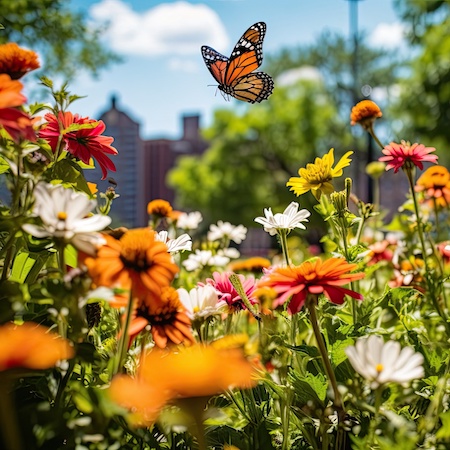Leading health organisations from across the UK have called on the government to increase action to protect our natural ecosystems for the benefit of the nation's health.
The call comes on the back of a policy report published today by the UK Health Alliance on Climate Change (UKHACC) that outlines a cycle of events that contribute to the loss of nature, climate change, and poor health. It's a cycle the health leaders say we need to break.
Natural environments that are biodiverse with a variety of plant and animal life are fundamental to human health. We depend on this biodiversity for food, medicine, energy, clean air and water, security from natural disasters, recreation and cultural wellbeing. Without it, our health suffers. Today, biodiversity is declining at its fastest rate in human history and the impacts on our health include increased risk of diseases, reduced capacity to develop new medicines derived from nature, food and water insecurity, and harm to physical and mental wellbeing. Natural spaces also provide a cooling effect, which is particularly important during heatwaves.
The report lays out seven areas, in which the health leaders say the UK government needs to increase action to protect the land and sea, both in the UK and through its international commitments, to prevent further harm to health and loss of life caused by the loss of nature:
• Protecting nature and biodiversity in towns and cities
• Prioritising and promoting plant-based and sustainably sourced food, limiting waste and building resilience against food insecurity
• Ensuring the UK delivers its International Financial Commitments to support nature and biodiversity
• Putting an end to subsidies, investments and new exploration for fossil fuels, while ensuring a just transition to renewable energy
• Reducing plastic waste by banning the production and sale of unnecessary plastic items with simultaneous efforts to incentivise reusing, recycling, and the production and utilisation of alternative compostable materials
• Increasing knowledge and understanding of human and ecological risks caused by the presence of pharmaceutical products in water bodies
• Strengthening international financial flows and capacity-building to support and implement solutions to save marine ecosystems.
The health leaders launched the report with a cycle to Camley Street Natural Park to highlight the benefits of an urban nature reserve in London. Dr Anandita Pattnaik, a policy officer with the UKHACC, says: “More than 84% of the UK population lives in urban areas. The expansion of towns and cities has led to the loss of nature due to changes in land use, pollution and unhealthy lifestyles. We need to see changes that support a biodiverse nature and enable access to high-quality green and blue spaces for everyone that can help improve both physical and mental health. We hope that by visiting one such place in London, we'll help to raise awareness of how beneficial they are for health and nature.”
Richard Smith, Chair of UKHACC adds: “We have been slow to recognise that nature is not something outside us but that we are part of nature and that healthy nature is essential for our health. We call on the government and other authorities to increase actions to preserve and promote nature not just for the sake of the environment but for the sake of health.”











